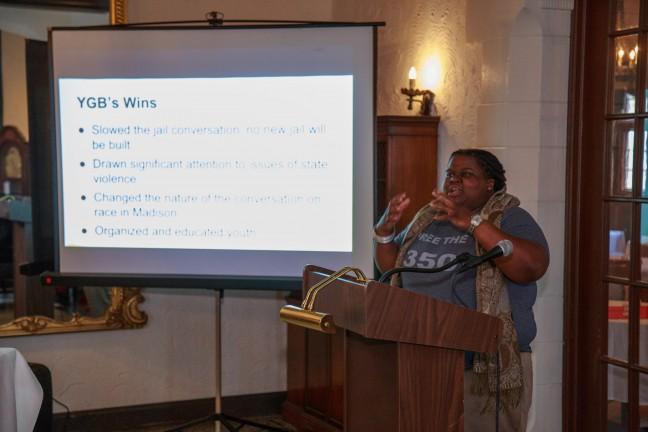Young, Gifted and Black is known for their protests pertaining to the Tony Robinson shooting, but a meeting with University of Wisconsin faculty Friday presented a broader view of the coalition.
UW faculty and staff filled the University Club alongside members of YGB Friday afternoon. The meet and greet was designed to help UW faculty connect with YGB members and get some of their questions answered, Karma Chavez, a UW communication arts professor, said.
“At a university with such a big protest and movement history, it was important to bring faculty in contact with the local movement that’s happening now,” Chavez said. “That’s so important to the community.”
Planning for the event started after YGB hosted a youth civil disobedience training session on UW’s campus, Matthew Braunginn, YGB’s Madison chapter’s co-founder, said. This event caused some city officials to believe YGB was teaching violent methods of resistance, Braunginn said.
Friday’s event was designed to give YGB the opportunity to communicate directly to UW faculty and staff that they do not advocate violence, Patrick Barrett, administrative director for the A. E. Havens Center for the Study of Social Justice, said.
“In no way did we suggest to our youth to actively participate in violent resistance,” Braunginn said. “We hope to gain and build trust, to show them the side of YGB that isn’t portrayed by the media.”
Barrett claimed political establishment and mainstream media has frequently portrayed YGB in a distorted way.
“The objective is to give people on campus personalities to go with the faces they are seeing on TV,” Chavez said. “And to demystify some of the negativity surrounding Young, Gifted and Black.”
There is frequently a divide between college campuses and the cities surrounding them, Barrett said. Bridging the gap between the community and YGB is especially important for UW faculty, who can help tie social issues into what is being taught in the classroom, T. Banks, a YGB leader, said.
Faculty should be aware of the resources that YGB leaders present, Chavez said. UW faculty and staff can directly participate in the movement, but can also bring YGB members into the classroom to help educate students on disparities in Madison and the organization’s history.
YGB was founded not long after the officer-involved death of Michael Brown in Ferguson, Missouri. Many of the current members of YGB were able to travel to Ferguson, where they gained the knowledge that helped them to start their own coalition in Madison, M. Adams, a YGB leader, said.
YGB was founded alongside the movement “Black Lives Matter,” which has been a growing national movement, Adams said. Their current efforts include demands related to improving conditions in the Dane County jail, a demand to assist in achieving justice for Tony Robinson and a proposal to give the community more power over policing, Adams said.
The conversation about race has been an active one in Madison for a while, but YGB has worked to shift the focus of the conversation to that of structural racism, Barrett said.
During a short speech, Patrick Sims, interim vice provost for diversity and climate at UW, showed his support for YGB’s efforts for a more equitable society. Diversity and equality are always goals for the community, but it is an ongoing process, Sims said.
“It’s not going to be easy,” Sims said during his speech. “Anything worth fighting for rarely is.”












